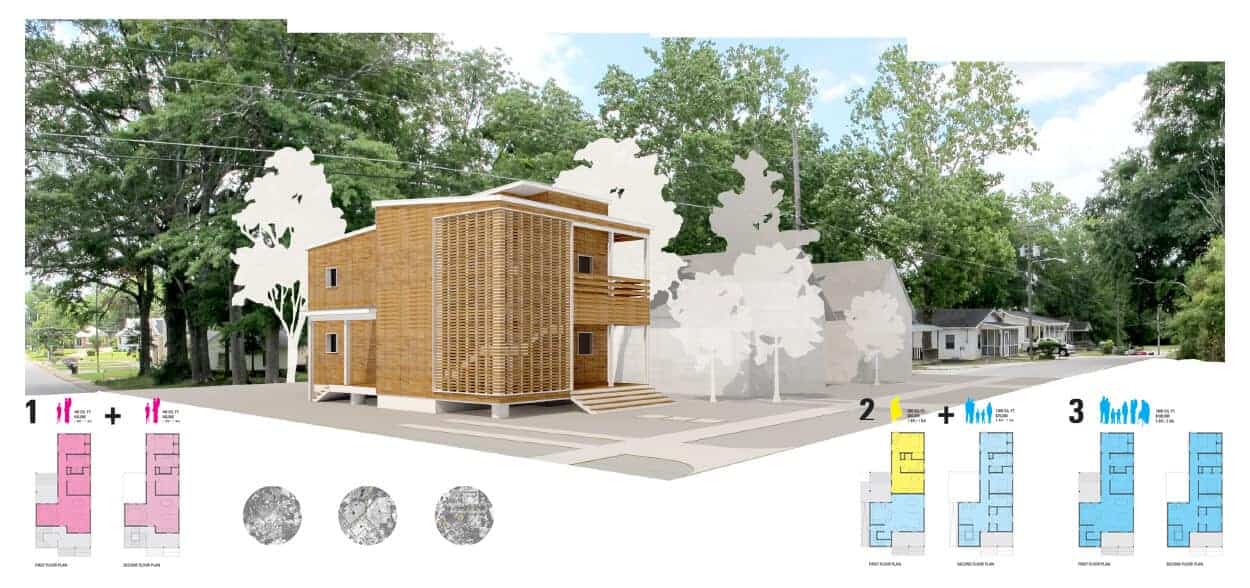Better Homes Build Better Lives

A research team from Auburn University’s College of Architecture, Design and Construction (CADC) has been awarded a major HUD grant for the development of housing solutions for people with disabilities and those seeking to age in place. CADC faculty have partnered with Auburn’s Center for Disability Research and Policy Studies (CDRPS), creating an interdisciplinary corps of architects, designers, construction professionals, smart home technologists, people with disabilities and disability research and policy specialists. Advisory Council members for the project include representatives from Habitat for Humanity, AARP, Volunteers of America, Alabama Institute of Deaf and Blind, Alabama Home Builders Association and individuals with disabilities who are actively engaged in policy issues, advocacy and home adaptation.
The project team is made up of Justin Miller, Principal Investigator (PI) and Chair of the Architecture program at the School of Architecture, Planning and Landscape Architecture; Co-PI Wesley Collins from the McWhorter School of Building Science and Co-PI Christine Fleming, Director of the CDRPS at the College of Education. Other team members include Rusty Smith, Associate Director of the Rural Studio program; David Hill, Chair of the Landscape Architecture program; and Jerrod Windham and Shu Wen Tzeng, faculty from the Industrial Design program at the School of Industrial and Graphic Design.
Leveraging their combined expertise, the team strives to achieve dignified, practical solutions for the design and construction of affordable, accessible housing. Working closely with HUD and the Advisory Council, the team is developing new and adapted home designs and prototypes that will be tested by people with specific disabilities. The collaboration will also produce policy recommendations, tools and strategies for educating the public and the design/construction sector.
Studies conducted by federal and state government agencies, NGOs and independent living advocates attest to the need for accessible housing that accommodates people with significant disabilities and those planning to remain in their homes as they age. However, the interrelationships between poverty, substandard housing conditions, poor health, physical and developmental disabilities and the scarcity of credit create complex challenges to the effective solution of affordable, accessible housing for the growing population with special needs. To address these challenges, the CADC team will develop designs for new construction of a range of affordable, energy-efficient single-family homes and for the renovation of kitchens, bathrooms and other rooms in existing homes. A fundamental aspect of the team’s approach will be the incorporation of usability testing with real clients and experts from the CDRPS.
The team will also promote stakeholder education through a variety of informational products: applications and smart home technology design, websites and app access codes published in stakeholder publications for those who want to make home modifications and in-store displays about disability-related products and strategies for home improvement retailers. An extensive illustrated manual will be compiled for contractors and individuals seeking to build or renovate homes to accommodate persons with disabilities.
The interdisciplinary team is uniquely positioned to address the challenges posed by accessibility, aging and affordable housing. CADC has more than 20 years of experience in the design and construction of dignified, affordable housing through its work at programs including Rural Studio (a partnership with communities in Alabama’s Black Belt) and DESIGNhabitat (a partnership with Habitat for Humanity). Working together, architecture and building construction faculty combine their expertise to promote cost efficiency and consistent quality. Landscape architects on the team provide solutions for exterior accessibility and connectivity to vital services. Industrial and graphic design faculty bring extensive experience and industry partnerships for the use of smart technology in home-based support systems that incorporate user-interfaces for touch, voice and eye control. These team members also provide expertise in information dissemination through apps, print materials and online resources. CADC’s long-standing partnership with CDRPS has resulted in a time-tested method that involves input from real clients in the design process and usability testing of proposed prototypes and solutions. The CDRPS also contributes extensive policy experience to the project, along with the profound understanding of needs arising from a range of disabilities.
Most importantly, members of the team share a conviction that the quality of the built environment is inextricably related to quality of life, health and prosperity. As CADC Dean Vini Nathan has expressed, “This transdisciplinary team of Auburn researchers is uniquely positioned to assist HUD in addressing the complex issues related to the design and construction of affordable, sustainable, accessible housing for people with special needs and circumstances. The expected outcomes of this project have the potential for transformative impact in this domain.”
See more in:
Faculty,
Faculty Work,
Industry Collaboration,
Outreach,
Research